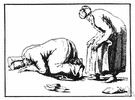ulama
Also found in: Thesaurus, Encyclopedia, Wikipedia.
Related to ulama: Nahdlatul Ulama
u·la·ma
(o͞o′lə-mä′)n.
Variant of ulema.
American Heritage® Dictionary of the English Language, Fifth Edition. Copyright © 2016 by Houghton Mifflin Harcourt Publishing Company. Published by Houghton Mifflin Harcourt Publishing Company. All rights reserved.
ulama
(ˈuːlɪmə) orulema
n
1. (Islam) a body of Muslim scholars or religious leaders
2. (Islam) a member of this body
[C17: from Arabic `ulamā scholars, from `alama to know]
ulama
(ˌuːˈlɑːmə)n
(Team Sports, other than specified) a Meso-American team ball game, with a history dating back to as early as 1500 bc, played with a solid rubber ball on a long narrow court
[from Nahuatl Ullamalitztli ball game]
Collins English Dictionary – Complete and Unabridged, 12th Edition 2014 © HarperCollins Publishers 1991, 1994, 1998, 2000, 2003, 2006, 2007, 2009, 2011, 2014
'u•la•ma
or u•le•ma
(ˈu ləˌmɑ)n.pl.
the body of scholars who are authorities on Muslim religion and law.
[1680–90; < Arabic ‘ulamā learned men]
Random House Kernerman Webster's College Dictionary, © 2010 K Dictionaries Ltd. Copyright 2005, 1997, 1991 by Random House, Inc. All rights reserved.
ThesaurusAntonymsRelated WordsSynonymsLegend:
Switch to new thesaurus
| Noun | 1. |  ulama - the body of Mullahs (Muslim scholars trained in Islam and Islamic law) who are the interpreters of Islam's sciences and doctrines and laws and the chief guarantors of continuity in the spiritual and intellectual history of the Islamic community ulama - the body of Mullahs (Muslim scholars trained in Islam and Islamic law) who are the interpreters of Islam's sciences and doctrines and laws and the chief guarantors of continuity in the spiritual and intellectual history of the Islamic communitybody - a group of persons associated by some common tie or occupation and regarded as an entity; "the whole body filed out of the auditorium"; "the student body"; "administrative body" |
Based on WordNet 3.0, Farlex clipart collection. © 2003-2012 Princeton University, Farlex Inc.